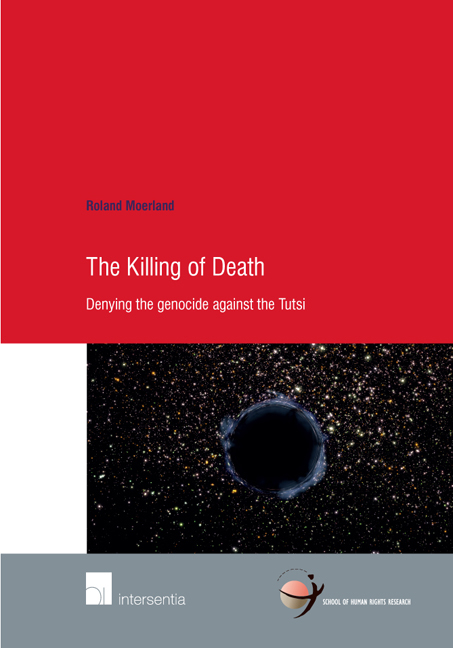Book contents
- Frontmatter
- Dedication
- Preface
- Contents
- List of abbreviations
- Table of figures
- Introduction
- Part I Exploration
- Part II Inspection
- Chapter 4 Official denial of the genocide against the Tutsi
- Chapter 5 Recycling official denial
- Part III Reflection
- Chronological overview of significant interviews, consultations and events
- Selected bibliography
- Curriculum vitae
- School of Human Rights Research Series
Chapter 5 - Recycling official denial
from Part II - Inspection
Published online by Cambridge University Press: 21 September 2018
- Frontmatter
- Dedication
- Preface
- Contents
- List of abbreviations
- Table of figures
- Introduction
- Part I Exploration
- Part II Inspection
- Chapter 4 Official denial of the genocide against the Tutsi
- Chapter 5 Recycling official denial
- Part III Reflection
- Chronological overview of significant interviews, consultations and events
- Selected bibliography
- Curriculum vitae
- School of Human Rights Research Series
Summary
Introduction
In his book Genocide and the politics of memory, Hirsch (1995, p. 24) points out that memory and history are not exclusively the domain of the historian. In contrast, many other actors, such as scholars from other academic disciplines, political activists, journalists, filmmakers, lawyers, etc. engage in the construction of memory and history: “It is from them more than from historians that the public mainly receives whatever conceptions, impressions, fantasies and delusions it may entertain about the past” (Vann Woodward 1989 Quoted in Hirsch, 1995, p. 24). Hirsch more particularly refers to Robertson's study on memory and history titled American myth, American reality (Robertson, 1980). Following Robertson, Hirsch (1995, p. 25) explains that history can be described as the memory of the lives and actions of people. Their memory is contained or embodied in a wide variety of objects, such as personal narratives, speeches, films, books, rituals, complex political institutions, etc. Whether they are true or not, these are the conduits of memory and the building blocks of history, which have been remembered and transmitted. The impact of other actors on the history of the genocide against the Tutsi should therefore not be underestimated as their ideas and representations of what happened have an impact on the construction of its history and thereby on its reality. The previous Chapter discussed how those who were implicated in the genocide against the Tutsi discursively constructed their history of the events and transmitted it to the public. The denial of the genocide against the Tutsi has however moved beyond the realm of official denial and the group of genocide deniers has expanded involving actors who were initially not implicated in the genocide. Surprisingly, this group also includes Western academics and journalists. The alternative theories these actors present are dangerous because they willingly or unwillingly “lend weight to the Hutu Power's mantra” (Odom, 2008). They empower the official denial of the genocide against the Tutsi because, in constructing and transmitting their version of history, these actors draw upon crucial elements contained in the official denial discourse analysed in the last Chapter and they thereby recycle the denial of the genocide against the Tutsi.
- Type
- Chapter
- Information
- The Killing of DeathDenying the genocide against the Tutsi Roland Moerland, pp. 187 - 230Publisher: IntersentiaPrint publication year: 2016

